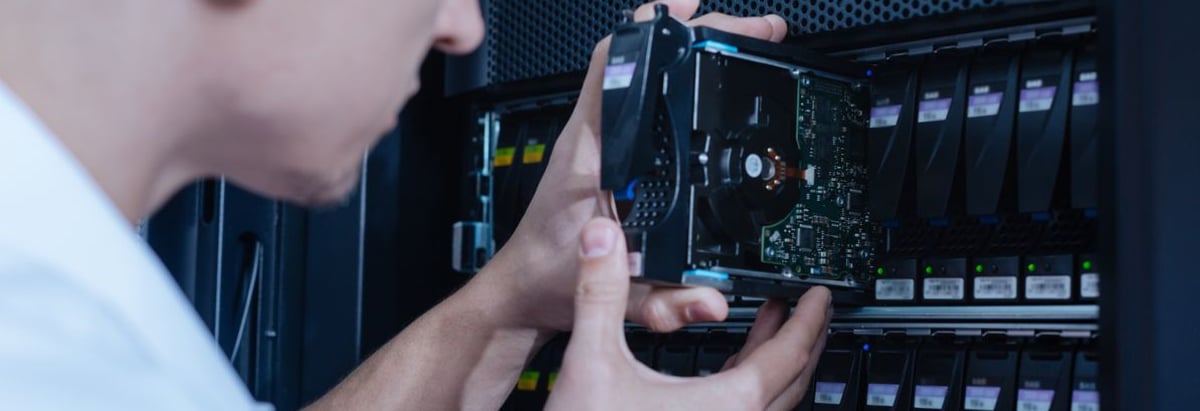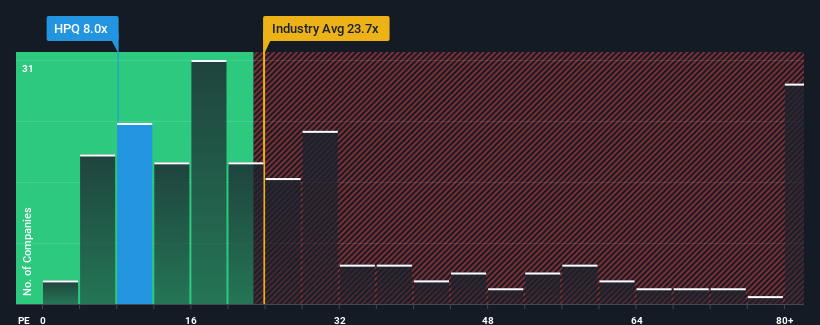
When close to half the companies in the United States have price-to-earnings ratios (or "P/E's") above 17x, you may consider HP Inc. (NYSE:HPQ) as a highly attractive investment with its 8x P/E ratio. Although, it's not wise to just take the P/E at face value as there may be an explanation why it's so limited.
Recent times have been pleasing for HP as its earnings have risen in spite of the market's earnings going into reverse. One possibility is that the P/E is low because investors think the company's earnings are going to fall away like everyone else's soon. If not, then existing shareholders have reason to be quite optimistic about the future direction of the share price.
See our latest analysis for HP

What Are Growth Metrics Telling Us About The Low P/E?
The only time you'd be truly comfortable seeing a P/E as depressed as HP's is when the company's growth is on track to lag the market decidedly.
Taking a look back first, we see that the company grew earnings per share by an impressive 39% last year. Pleasingly, EPS has also lifted 48% in aggregate from three years ago, thanks to the last 12 months of growth. Therefore, it's fair to say the earnings growth recently has been superb for the company.
Shifting to the future, estimates from the analysts covering the company suggest earnings growth is heading into negative territory, declining 3.5% each year over the next three years. That's not great when the rest of the market is expected to grow by 11% per annum.
In light of this, it's understandable that HP's P/E would sit below the majority of other companies. Nonetheless, there's no guarantee the P/E has reached a floor yet with earnings going in reverse. Even just maintaining these prices could be difficult to achieve as the weak outlook is weighing down the shares.
The Key Takeaway
Generally, our preference is to limit the use of the price-to-earnings ratio to establishing what the market thinks about the overall health of a company.
As we suspected, our examination of HP's analyst forecasts revealed that its outlook for shrinking earnings is contributing to its low P/E. Right now shareholders are accepting the low P/E as they concede future earnings probably won't provide any pleasant surprises. Unless these conditions improve, they will continue to form a barrier for the share price around these levels.
Before you settle on your opinion, we've discovered 5 warning signs for HP (2 make us uncomfortable!) that you should be aware of.
It's important to make sure you look for a great company, not just the first idea you come across. So take a peek at this free list of interesting companies with strong recent earnings growth (and a low P/E).
Valuation is complex, but we're here to simplify it.
Discover if HP might be undervalued or overvalued with our detailed analysis, featuring fair value estimates, potential risks, dividends, insider trades, and its financial condition.
Access Free AnalysisHave feedback on this article? Concerned about the content? Get in touch with us directly. Alternatively, email editorial-team (at) simplywallst.com.
This article by Simply Wall St is general in nature. We provide commentary based on historical data and analyst forecasts only using an unbiased methodology and our articles are not intended to be financial advice. It does not constitute a recommendation to buy or sell any stock, and does not take account of your objectives, or your financial situation. We aim to bring you long-term focused analysis driven by fundamental data. Note that our analysis may not factor in the latest price-sensitive company announcements or qualitative material. Simply Wall St has no position in any stocks mentioned.
About NYSE:HPQ
HP
Provides personal computing, printing, 3D printing, hybrid work, gaming, and other related technologies in the United States and internationally.
Very undervalued average dividend payer.
Similar Companies
Market Insights
Community Narratives


